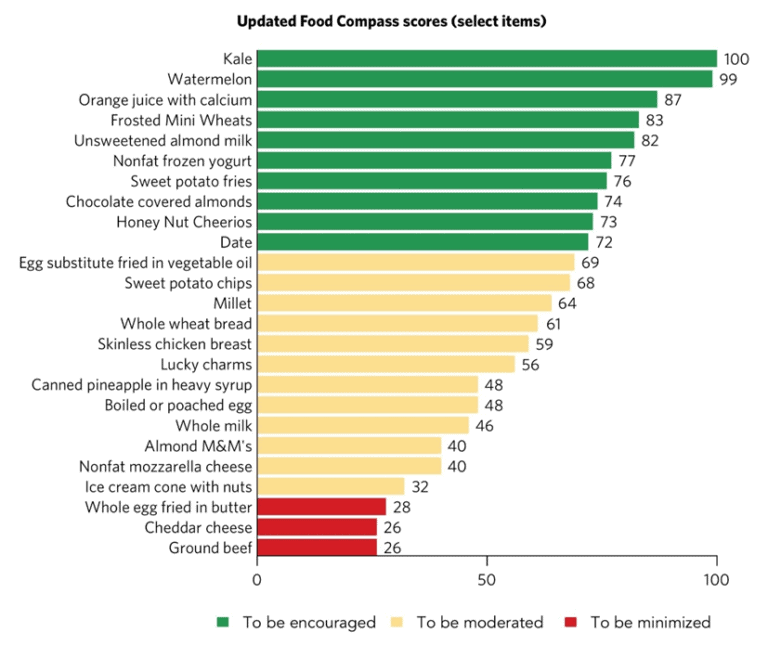A group of nine authors from the Friedman School of Nutrition Science and Policy, Tufts University, Boston, published a paper in the October 2021 issue of Nature Food, “Food Compass is a nutrient profiling system using expanded characteristics for assessing healthfulness of foods” [PDF], describing a “novel nutrient profiling system” which assigns a Food Compass Score between 1 and 100 to various foods, claimed to measure the healthfulness of that food item. Those scoring greater than or equal to 70 are “to be encouraged”, 31–69 “to be consumed in moderation”, and less than or equal to 30 “to be minimized”. Here is the abstract from the paper.
Nutrient profiling systems (NPS) aim to discriminate the healthfulness of foods for front-of-package labelling, warning labels, taxation, company ratings and more. Existing NPS often assess relatively few nutrients and ingredients, use inconsistent criteria across food categories and have not incorporated the newest science. Here, we developed and validated an NPS, the Food Compass, to incorporate a broader range of food characteristics, attributes and uniform scoring principles. We scored 54 attributes across 9 health-relevant domains: nutrient ratios, vitamins, minerals, food ingredients, additives, processing, specific lipids, fibre and protein, and phytochemicals. The domain scores were summed into a final Food Compass Score (FCS) ranging from 1 (least healthy) to 100 (most healthy) for all foods and beverages. Content validity was confirmed by assessing nutrients, food ingredients and other characteristics of public health concern; face validity was confirmed by assessing the FCS for 8,032 foods and beverages reported in NHANES/FNDDS 2015–16; and convergent and discriminant validity was confirmed from comparisons with the NOVA food processing classification, the Health Star Rating and the Nutri-Score. The FCS differentiated food categories and food items well, with mean ± s.d. ranging from 17.1 ± 17.2 for savoury snacks and sweet desserts to 81.6 ± 16.0 for legumes, nuts and seeds. In many food categories, the FCS provided important discrimination of specific foods and beverages as compared with NOVA, the Health Star Rating or the Nutri-Score. On the basis of demonstrated content, convergent and discriminant validity, the Food Compass provides an NPS scoring a broader range of attributes and domains than previous systems with uniform and transparent principles. This publicly available tool will help guide consumer choice, research, food policy, industry reformulations and mission-focused investment decisions.
The paper was accompanied by a “Supplementary Information” [PDF, 208 pages] document providing details of the methodology and analysis and a table of 8032 foods and beverages ranked by Food Compass Score. The latter table is a gold mine for cherry picking by those inclined to mock the “wisdom” of “nutrition scientists”.
A fine job of this has been done by the Optimising Nutrition site, which published “Is Tufts University’s Food Compass Nutrient Profiling System ‘Broken’?” in response. Here is a table from that article showing the Food Compass Scores of selected items from the Supplementary Information document.
Frosted Mini Wheats cereal scores 83, skinless chicken breast 59, whole milk 46, and ground beef 26. The lengthy article goes through the Food Compass ranking methodology item by item, confronting them with reality and common sense.
Who paid for the Food Compass “research”? Well, let’s see…
This research was supported by Danone (N.H.E.-A., W.A.M., P.J., P.S., J.B.B. and R.M.) and the National Heart, Lung, and Blood Institute, National Institutes of Health (grant nos R01 HL130735 (R.M.) and 2 R01 HL115189 (D.M.)). The funders had no role in study design, data collection, data analysis or interpretation, drafting of the manuscript, or decision to submit the manuscript for publication. We thank S. Gerber (Tufts University) for helpful insights on processing attributes.
Danone is a processed food company with global revenue (2019) of €25.3 billion. The U.S. National Institutes of Health require no introduction.
I am sure that the late Ancel Keys and perpetrators of the food pyramid would approve of this work.
